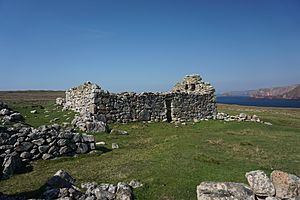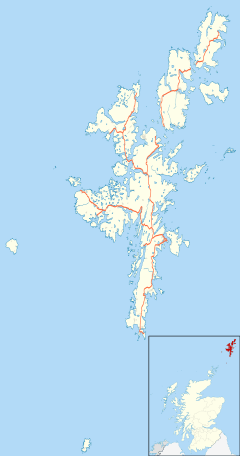Tingon facts for kids
Quick facts for kids Tingon |
|
|---|---|
 Sumra, an abandoned croft house in Tingon |
|
| Population | 0 |
| Language | Shetland dialect |
| OS grid reference | HU2482 |
| Civil parish | |
| Council area | |
| Lieutenancy area | |
| Country | Scotland |
| Sovereign state | United Kingdom |
| Post town | SHETLAND |
| Postcode district | ZE2 |
| Dialling code | 01806 |
| Police | Northern |
| Fire | Highlands and Islands |
| Ambulance | Scottish |
| EU Parliament | Scotland |
| UK Parliament |
|
| Scottish Parliament |
|
Tingon is a peninsula located in the north-west part of Northmavine, which is an area in Shetland, Scotland. A peninsula is a piece of land almost completely surrounded by water but connected to the mainland on one side. On its eastern side, Tingon is bordered by a narrow sea inlet called Ronas Voe. To the west, it meets another sea inlet known as Hamnavoe.
Tingon is a very special place for nature. It has been given several important titles to protect its environment. It is known as a Ramsar site, which means it's a wetland of international importance. It's also a Special Protection Area, a Special Area of Conservation, and a Site of Special Scientific Interest. These titles help protect the unique plants, animals, and habitats found there. Tingon is also the name for a group of small settlements that used to be on the peninsula. Sadly, most people living in these settlements were forced to leave their homes a long time ago during an event called the Highland Clearances.
History of Tingon Settlements
In the past, Tingon was home to many small farms called crofts. A croft is a small piece of land, usually with a house, that a family would farm to live. At its busiest time, Tingon had 14 crofts in total.
These crofts were spread out across different areas of the peninsula. For example, there was one croft each at places named Knowes, Sannions, Sumra, Ocran, Ocraness, Quidadale, Westerhouse, and Aurora (which people pronounced as 'Rora'). In addition, the areas called Southerhouse, Northerhouse, and Easterhouse each had two crofts.
However, most of these families were forced to leave their homes during the Highland Clearances. This was a sad time in Scottish history, mainly in the 18th and 19th centuries, when many people in the Highlands and Islands were made to move off their land. Landowners often wanted to use the land for sheep farming or other purposes instead of for small family farms. This led to many communities, like those in Tingon, becoming empty.
 | Tommie Smith |
 | Simone Manuel |
 | Shani Davis |
 | Simone Biles |
 | Alice Coachman |


